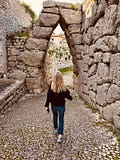Telic vs atelic activities and the meaning of life
A good life results from a judicious mix of things we do for a purpose and things we do for their own sake
A few years ago I read an interesting review of a then new book by philosopher Kieran Setiya, entitled Midlife: A Philosophical Guide (Princeton University Press). Like me, Setiya is an academic philosopher who has rediscovered the ancient notion that philosophy ought to matter to people. It’s fine and dandy to publish abstruse but “fun” technical papers that will be read by a few dozen people and that will get you tenure and promotion, but are you making a difference in your own and other people’s lives? If the answer is negative (and it is for many academics, not just in philosophy) then you may want to reconsider what you are doing and why.
This essay is not about Setiya’s book, which begins with a premise—a personal midlife crisis—very much like my own How to Be a Stoic. Rather, the reviewer, Anil Gomes, reminded me of an all-important distinction among activities that make our life meaningful, one that in turn showed me once again just how much the Stoics got right about the human condition.
Said distinction was introduced by Aristotle, who I think got it exactly right. And yet, in my mind, the Stoics (and, to be fair, others, like the Epicureans) were the ones that actually put it into practice. Aristotle said that there are two broad categories of activities that may make life meaningful: telic and atelic.
Telos in Greek means purpose, or goal. Telic activities vary from fairly difficult and unusual ones, like making it into the Olympic squad for a particular sport or writing a book, to the more common ones of getting a college degree or obtaining a promotion at work. The problem with telic activities is that they generate a paradox: if you fail, you are unhappy because you failed. But if you succeed, then the pleasure you got from reaching your goal is extinguished right at the moment you do achieve it, or shortly thereafter.
When I moved to the United States in 1990 I remember vividly the satisfaction I got from obtaining my PhD in biology at the University of Connecticut. Even my (long divorced) parents made the cross-Atlantic trip (together!) to come and celebrate my achievement. But already a couple of days later, once the euphoria subsided, I found myself wondering what the next telos would be, and how to achieve it.
The case of professional athletes is still more stark. You work your entire early life to win the World Cup, the US Opens, or the Super Bowl. Very few people actually achieve that sort of telos. But once you have, you are staring at the rest of your life, during which you are unlikely to repeat that feat, and even if you did repeat it, it wouldn’t be the same thing. At any rate, pretty soon your body won’t be able to withstand that kind of treatment so you’ll have to “retire” at an age at which most people just begin to hit their stride.
Or, my favorite example, think of Neil Armstrong. He was the first man to set foot on the Moon, in the historical landing of the Apollo 11 “Eagle” module, the night of 20 July 1969. “That’s one small step for a man, one giant leap for mankind,” Armstrong famously said. (There is a good movie about that epic event, starring Ryan Gosling.) I’m sure that was an incredibly meaningful event for Armstrong, but I’m also sure he knew that nothing even remotely close to that would ever happen again in his life. He was 39 in 1969, and died at the age of 82.

So, the point is that telic activities may be very meaningful for people (personally, I certainly include writing this very newsletter among my modest list), but they cannot be sustained, and they generate the dissatisfaction paradox mentioned above. Then what?
Aristotle proposed that the second class may come to the rescue, atelic activities. This, at first, sounds strange. You mean I’m supposed to get meaning in my life out of things that have no goal? What the heck?
But stay with me. Atelic activities are done for their own sake, not in order to achieve a particular end. For instance, in case you go out for a walk just because you like walking. Or if you play a sport not because you want to become a professional, impress others, and the like, but because you like it. The activity is its own reward. And—unlike the telic case—it’s potentially endlessly renewable.
Arguably the most important atelic activities in a human being’s life are spending time with your partner, your children (if you have any), and your friends. These are things you do for their own sake, not because you are aiming at a distant goal. And they are pleasurable, meaningful, and potentially last a lifetime.
What does any of the above have to do with Stoicism? A key concept of the philosophy is that the chief good in life is the practice of virtue. And virtue is to be practiced not in order to make oneself look good, or to achieve a personal goal. It is to be practiced because it is good in itself, it is it’s own reward.
Virtue, that is, is a fundamentally atelic activity, and it keeps providing us with meaning all the way to the moment we die. Moreover, while we may lose our partner, friends, and even our children, before that last moment comes, we do not lose the ability to practice virtue, no matter what.
That’s why the Stoics valued relationships and friendship very much but did not put them at the very top of the scale of values. That pinnacle is reserved for the kind of thing you truly can never lose. But of course how you relate to your partner, children, and friends (as well as anyone else, for that matter) is precisely how you practice virtue. Seen this way, you can make sense of what Seneca says both about friendship and about virtue itself:
“If you consider any person a friend whom you do not trust as you trust yourself, you are mightily mistaken and you do not sufficiently understand what true friendship means.” (Letters III.2)
And:
“The reward for all the virtues lies in the virtues themselves. For they are not practiced with a view to recompense; the wages of a good deed is to have done it.” (Letters LXXXI.19)
A good life, in the end, is a judicious mix of telic and atelic pursuits. By all means, set yourself the goal of getting a promotion, writing a book, or competing in the Olympics. But don’t forget the here and now, and the attention to be given to the people you love. For their own sake. Oh, and practice virtue, always.




Excellent description & differentiation of telic & atelic pursuits, showing that the development of virtue as an atelic pursuit us a reward unto itself.
Massimo, If one values ongoing learning as a process lasting many decades, it seems the categories can be complementary. There can be complexity in learning experiences which include the benefits of debate and personal interactions - not sought in advance. Also, walking has frequently provided tangential experiences for me which became telic such as spotting an uncommon bird and identifying it, ditto a mushroom or wildflower. I suppose inquisitiveness is a virtue, but as a determinist I guess I had no choice in the matter.